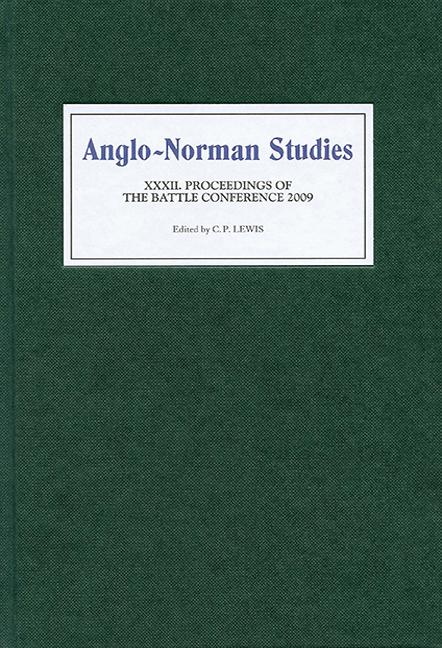Book contents
- Frontmatter
- Contents
- List of Maps and Tables
- Editor's Preface
- Abbreviations
- The Peace of God and Bishops at War in the Gallic Lands from the Late Tenth to the Early Twelfth Century
- Ad erudiendum tradidit: The Upbringing of Angevin Comital Children
- Coming and Going: The Use of Outdoor Space in Norman and Anglo-Norman Chronicles
- The Urban Transformation in England, 900–1100
- The Taming of the Laity: Writing Waltheof and Rebellion in the Twelfth Century
- Close Relations? Some Examples of Trade Links between England and the Towns and Ports of Lower Normandy in the Thirteenth and Early Fourteenth Centuries
- The Roots of the English Royal Forest
- Knighthood and Chivalry in the Histories of the Norman Dukes: Dudo and Benoît
- Prayers for the King and Royal Titles in Anglo-Norman Charters
- Domesday Mortlake
- Miscellaneous Endmatter
Editor's Preface
Published online by Cambridge University Press: 28 April 2017
- Frontmatter
- Contents
- List of Maps and Tables
- Editor's Preface
- Abbreviations
- The Peace of God and Bishops at War in the Gallic Lands from the Late Tenth to the Early Twelfth Century
- Ad erudiendum tradidit: The Upbringing of Angevin Comital Children
- Coming and Going: The Use of Outdoor Space in Norman and Anglo-Norman Chronicles
- The Urban Transformation in England, 900–1100
- The Taming of the Laity: Writing Waltheof and Rebellion in the Twelfth Century
- Close Relations? Some Examples of Trade Links between England and the Towns and Ports of Lower Normandy in the Thirteenth and Early Fourteenth Centuries
- The Roots of the English Royal Forest
- Knighthood and Chivalry in the Histories of the Norman Dukes: Dudo and Benoît
- Prayers for the King and Royal Titles in Anglo-Norman Charters
- Domesday Mortlake
- Miscellaneous Endmatter
Summary
The 32nd annual Battle Conference was held from 30 July to 3 August 2009 away from the venue that has been customary for four years in every five, because Pyke House in Battle was closed. Instead, the conference returned to the University of Wales Conference Centre at Gregynog, where the 2007 conference had been held so successfully. Holding the conference away from Battle imposes extra administrative tasks. This year they were despatched with efficiency and style by Charlotte Cart-wright. Everyone who attended the conference, but especially the director, thanks her warmly for everything that she did to make the conference run smoothly.
All but one of the papers read during the conference are printed here, and it is hoped to include Julian Munby's paper on the Domesday boroughs in volume 33. The Allen Brown Memorial Lecture, honouring the conference's founder, was delivered on the first evening by Professor Dominique Barthélemy of the Sorbonne. The lecture is supported by the R. Allen Brown Memorial Trust, a registered charity, which welcomed a large group of members of the Powysland Club and other local historians to the event. As always, the conference was international in scope, speakers and delegates travelling this year from four countries outside the UK and representing nine nationalities. Further information about the Battle Conference can be seen at www.battleconference.com.
The outing on Saturday 1 August concentrated on the remains of two great monasteries of the Severn valley, Buildwas abbey and Wenlock priory. The visit to Buildwas also took in the abbot's lodgings, now in use as a social club, where the steward was welcoming and the members tolerant. The party also visited two smaller churches of the eleventh century: the little known St Giles, Barrow, and St Eata, Atcham, notable among Anglo-Normanists for its connections with Orderic Vitalis and his editor Marjorie Chibnall. The site visits were led by Carol Davidson Cragoe and Chris Lewis. Lunch was taken at the George & Dragon, Much Wenlock, which provided excellent hospitality, food, and drink on a rather wet day. Back at Gregynog there was a display of new books by Boydell & Brewer, and a visit to the private press, Gwasg Gregynog.
- Type
- Chapter
- Information
- Anglo-Norman Studies XXXIIProceedings of the Battle Conference 2009, pp. vii - viiiPublisher: Boydell & BrewerPrint publication year: 2010

